Adenosine indication - Study guides, Class notes & Summaries
Looking for the best study guides, study notes and summaries about Adenosine indication? On this page you'll find 814 study documents about Adenosine indication.
Page 3 out of 814 results
Sort by
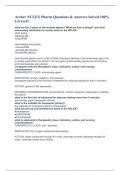
-
Archer NCLEX Pharm Questions & Answers Solved 100% Correct!!
- Exam (elaborations) • 7 pages • 2024
-
- $12.99
- + learn more
Archer NCLEX Pharm Questions & Answers Solved 100% Correct!! what are the 2 types of anti-anxiety agents? What are their endings? and what anti-anxiety medication is mostly used on the NCLEX? short acting -MidazoLAM -DiazePAM intermediate-long acting -clonazePAM -alprazoLAM (Xanax) -lorazePAM (ativan) (anti-anxiety agents end in LAM or PAM, lorazepam [ativan] is the antianxiety agen that is mostly used within the NCLEX, the two types of anti-anxiety agents are short acting and int...
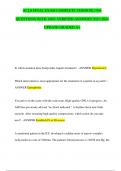
-
ACLS Final Exam 2023/2024 150 Questions and Answers
- Exam (elaborations) • 95 pages • 2023
-
- $25.99
- + learn more
ACLS Final Exam 2023/2024 150 Questions and Answers In which situation does bradycardia require treatment? - ANSWER Hypotension Which intervention is most appropriate for the treatment of a patient in asystole? - ANSWER Epinephrine You arrive on the scene with the code team. High-quality CPR is in progress. An AED has previously advised "no shock indicated." A rhythm check now finds asystole. After resuming high-quality compressions, which action do you take next? - ANSWER Establish IV ...
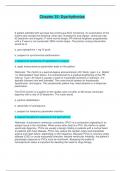
-
Chapter 35: Dysrhythmias | Questions, Answers and Rationales
- Exam (elaborations) • 73 pages • 2024
-
- $28.49
- + learn more
Chapter 35: Dysrhythmias | Questions, Answers and Rationales A patient admitted with syncope has continuous ECG monitoring. An examination of the rhythm strip reveals the following: atrial rate 74 beats/min and regular; ventricular rate 62 beats/min and irregular; P wave normal shape; PR interval lengthens progressively until a P wave is not conducted; QRS normal shape. The priority nursing intervention would be to a. give epinephrine 1 mg IV push. b. prepare for synchronized cardioversion. c...
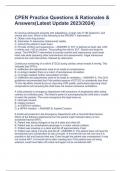
-
CPEN Practice Questions & Rationales & Answers(Latest Update 2023/2024)
- Exam (elaborations) • 34 pages • 2023
-
- $12.99
- + learn more
An anxious adolescent presents with palpitations, a heart rate of 184 beats/min, and normal skin tone. Which of the following is the PRIORITY intervention? A. Obtain urine drug screen. B. Administer IV adenosine (Adenocard) rapidly. C. Instruct the patient to bear down. D. Provide comfort and reassurance. - ANSWER D. SVT is defined as heart rate >220 in infants and >180 in children. Thus putting the child in SVT. Search and treat the cause. The PRIORITY intervention to provide comfort ...
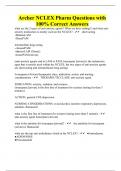
-
Archer NCLEX Pharm Questions with 100% Correct Answers
- Exam (elaborations) • 8 pages • 2023
- Available in package deal
-
- $10.99
- + learn more
what are the 2 types of anti-anxiety agents? What are their endings? and what anti-anxiety medication is mostly used on the NCLEX? - short acting -MidazoLAM -DiazePAM intermediate-long acting -clonazePAM -alprazoLAM (Xanax) -lorazePAM (ativan) (anti-anxiety agents end in LAM or PAM, lorazepam [ativan] is the antianxiety agen that is mostly used within the NCLEX, the two types of anti-anxiety agents are short acting and intermedicate-long acting) Lorazapam (Ativan) therapeutic cl...
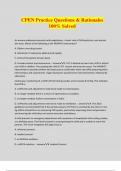
-
CPEN Practice Questions & Rationales 100% Solved
- Exam (elaborations) • 43 pages • 2024
- Available in package deal
-
- $14.49
- + learn more
CPEN Practice Questions & Rationales 100% Solved An anxious adolescent presents with palpitations, a heart rate of 184 beats/min, and normal skin tone. Which of the following is the PRIORITY intervention? A. Obtain urine drug screen. B. Administer IV adenosine (Adenocard) rapidly. C. Instruct the patient to bear down. D. Provide comfort and reassurance. - answerD. SVT is defined as heart rate >220 in infants and >180 in children. Thus putting the child in SVT. Search and treat the ...
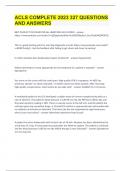
-
ACLS COMPLETE 2023 |327 QUESTIONS AND ANSWERS.
- Exam (elaborations) • 43 pages • 2023
- Available in package deal
-
- $13.99
- + learn more
BEST PLAYLIST I'VE FOUND FOR ALL HEART.ORG ACLS CODES! This is a good starting point for Jose (big Megacode at end): In which situation does bradycardia require treatment? Hypotension Which intervention is most appropriate for the treatment of a patient in asystole? Epinephrine You arrive on the scene with the code team. High-quality CPR is in progress. An AED has previousy advised "no shock indicated." A rhythm check now finds asystole. After resuming high-quality ...
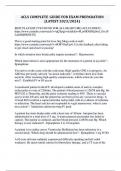
-
ACLS COMPLETE GUIDE FOR EXAM PREPARATION (LATEST 2023/2024)
- Exam (elaborations) • 35 pages • 2023
- Available in package deal
-
- $13.00
- + learn more
BEST PLAYLIST I'VE FOUND FOR ALL HEART.ORG ACLS CODES! - LakrRQDKOkTZj This is a good starting point for Jose (big Mega code at end): to get closer and closer to passing! In which situation does bradycardia require treatment? - Hypotension Which intervention is most appropriate for the treatment of a patient in asystole? - Epinephrine You arrive on the scene with the code team. High-quality CPR is in progress. An AED has previously advised "no shock indicated." A rhythm check now fi...
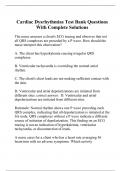
-
Cardiac Dysrhythmias Test Bank Questions With Complete Solutions
- Exam (elaborations) • 126 pages • 2023
- Available in package deal
-
- $26.99
- + learn more
The nurse assesses a client's ECG tracing and observes that not all QRS complexes are preceded by a P wave. How should the nurse interpret this observation? A. The client has hyperkalemia causing irregular QRS complexes. B. Ventricular tachycardia is overriding the normal atrial rhythm. C. The client's chest leads are not making sufficient contact with the skin. D. Ventricular and atrial depolarizations are initiated from different sites. correct answer: D. Ventricular and atrial ...
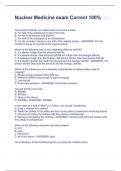
-
Nuclear Medicine exam Correct 100%
- Exam (elaborations) • 15 pages • 2024
- Available in package deal
-
- $12.09
- + learn more
The physical half-life of a radionuclide is the time it takes A. For half of the substances to leave the body B. For the kit to become half expired C. For half of the substance to be metabolised D. For the nuclide to decay to one half of the original activity - ANSWERD. For the nuclide to decay to one half of the original activity Which of the following can be said regarding effective half-life? A. It is always longer than the physical half-life B. It is always shorter than physical hal...

How much did you already spend on Stuvia? Imagine there are plenty more of you out there paying for study notes, but this time YOU are the seller. Ka-ching! Discover all about earning on Stuvia


